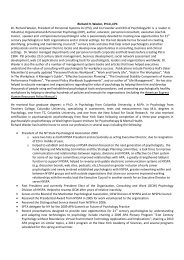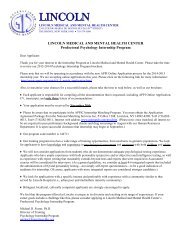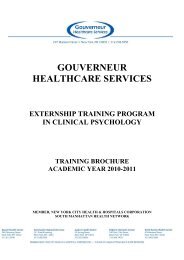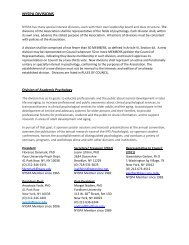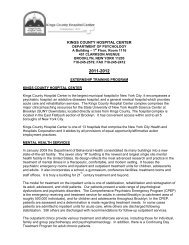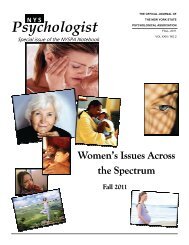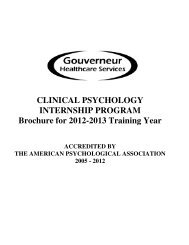Woodhull Medical Center - New York State Psychological Association
Woodhull Medical Center - New York State Psychological Association
Woodhull Medical Center - New York State Psychological Association
Create successful ePaper yourself
Turn your PDF publications into a flip-book with our unique Google optimized e-Paper software.
WELCOME TO WOODHULL MEDICAL CENTER<br />
Introduction to <strong>Woodhull</strong> <strong>Medical</strong> and Mental Health <strong>Center</strong><br />
We welcome you to <strong>Woodhull</strong> <strong>Medical</strong> and Mental Health <strong>Center</strong>’s Clinical Psychology Internship Program. Following<br />
you will find a description of our hospital, a view of our neighborhood, information about our population, and a summary<br />
of our training modality. We are accredited by the American <strong>Psychological</strong> <strong>Association</strong> through 2014.<br />
The <strong>New</strong> <strong>York</strong> City Health and Hospitals Corporation (HHC), the largest municipal hospital and health care system in<br />
the country, is a $5.4 billion public benefit corporation that serves 1.3 million <strong>New</strong> <strong>York</strong>ers and nearly 400,000 who are<br />
uninsured. HHC provides medical, mental health and substance abuse services through its 11 acute care hospitals, 4<br />
skilled nursing facilities, 6 large diagnostic, and treatment centers and more than 80 community based clinics. Its mission<br />
is the pursuit of excellence in:<br />
• Comprehensive and compassionate health services of the highest quality to all those needing care in an<br />
atmosphere of dignity and respect.<br />
• Health promotion, disease prevention, and the delivery of health care and serving as advocates, innovators, and<br />
educators in partnership with the communities we serve.<br />
• Improving the satisfaction of our patients, staff and other customers and enhance our primary care services.<br />
Develop strategic alliances with public and private partners. Match needs with resources.<br />
• Health care education of graduate students in Psychology.<br />
<strong>Woodhull</strong> <strong>Medical</strong> and Mental Health <strong>Center</strong>, is one of 11 municipal hospitals of <strong>New</strong> <strong>York</strong> City managed by the Health<br />
and Hospitals Corporation (HHC), a public benefit corporation created by the <strong>New</strong> <strong>York</strong> <strong>State</strong> legislature in 1970, to<br />
manage and assume the responsibility for the operation of municipal hospitals throughout the five boroughs of <strong>New</strong> <strong>York</strong><br />
City. <strong>Woodhull</strong> <strong>Medical</strong> and Mental Health <strong>Center</strong>, is situated in the Bedford-Stuyvesant section of Brooklyn. <strong>Woodhull</strong><br />
has 403 beds with an average of 23,000 admissions per year. Opened in 1982, <strong>Woodhull</strong> is a full service city hospital<br />
providing a wide range of inpatient medical and mental health services, and ambulatory care services. The ambulatory<br />
services include Surgery and Rehabilitation, Pediatrics, Obstetrics, Gynecology, Cardiology, Dentistry, and Mental<br />
Health. A new state-of-the-art Emergency Department provides necessary emergency services to the community. There<br />
are separate areas for adult, pediatric, and psychiatric cases. The Emergency Department is open twenty-four (24) hours a<br />
day, seven days a week. The medical center is fully accredited by the Joint Commission (JC).<br />
<strong>Woodhull</strong> <strong>Medical</strong> and Mental Health <strong>Center</strong> is the sole provider of inpatient obstetrical, psychiatric, and physical<br />
medicine and rehabilitation services in the North Brooklyn area. Our service areas have been given status as a Federal<br />
Health Manpower Shortage Area I (HMSA I) which indicates a severe paucity of health care providers compared to<br />
population at large.<br />
In 1996, <strong>Woodhull</strong> <strong>Medical</strong> and Mental Health <strong>Center</strong> entered into a joint operating system with Cumberland Diagnostic<br />
and Treatment <strong>Center</strong>, an ambulatory general and specialty care facility also located in the north Brooklyn area. The<br />
psychiatry programs operated by both facilities were integrated into one department. Cumberland Diagnostic and<br />
Treatment <strong>Center</strong> operates and provides only adult outpatient general and specialty medical care, mental health, and<br />
substance abuse programs. On August 1, 2007, <strong>Woodhull</strong> <strong>Medical</strong> and Mental Health <strong>Center</strong> entered into an affiliation<br />
agreement with <strong>New</strong> <strong>York</strong> University <strong>Medical</strong> <strong>Center</strong>.<br />
North Brooklyn encompasses the major areas of <strong>Woodhull</strong> <strong>Medical</strong> <strong>Center</strong>. According to the 2000 census data, <strong>Woodhull</strong><br />
serves some of the most economically disadvantaged neighborhoods in the borough. The demographics of the areas<br />
population are 53% Hispanic, 37% Black, 4% White, 3% Asian, and 3% other. Census data indicate that new immigrants<br />
2
have been arriving in the area at a slightly higher rate than the rest of Brooklyn, originating primarily from the Caribbean,<br />
Poland, Ecuador, Mexico, and China. The majority of the Hospital revenue (approximately 70%) is generated from<br />
Medicaid reimbursements. The medical center recorded 19,810 inpatient admissions during FY year 2010, along with<br />
over 88,884 emergency room visits. Among patients treated at the medical center, 17% are Medicare beneficiaries, 73%<br />
are Medicaid beneficiaries, 3% of the facility's patients are individuals whose care is funded by an HMO or other private<br />
health insurance plan, and 7% are self-pay.<br />
<strong>Woodhull</strong> <strong>Medical</strong> and Mental Health <strong>Center</strong> is located in Bedford-Stuyvesant area, 8 miles from Manhattan. The<br />
hospital is easily accessible by public transportation or car. It is within a 15-minute drive of <strong>New</strong> <strong>York</strong> City and provides<br />
easy access for local community residents and persons from nearby <strong>New</strong> <strong>York</strong> and <strong>New</strong> Jersey suburban areas. <strong>New</strong><br />
<strong>York</strong> City is the most populous city in the United <strong>State</strong>s, with its metropolitan area ranking among the largest urban areas<br />
in the world. Brooklyn is known as the city's most populous borough and for its cultural, social, and ethnic diversity, an<br />
independent art and music scene, distinct neighborhoods and a unique architectural heritage. It is also the only borough<br />
outside of Manhattan with a distinct downtown area. For more information visit: brooklyn.com or brooklynonline.com.<br />
<strong>Woodhull</strong> <strong>Medical</strong> <strong>Center</strong> and the Psychiatry Department is the primary sponsor of the psychology internship program.<br />
<strong>State</strong>wide, HHC has approximately 10000 employees, including a multidisciplinary clinical staff composed of<br />
psychiatrists, advanced practice nurses, psychologists, social workers, and counselors. <strong>Woodhull</strong> <strong>Medical</strong> <strong>Center</strong><br />
provides the full-range of behavioral health services to individuals throughout the life span.<br />
The North Brooklyn hub of HHC primarily serves residents of Bushwick/Williamsburg and surrounding areas, and is a<br />
major player in Brooklyn’s public mental health system. It provides psychology interns seeking to become culturally<br />
competent psychologists with excellent training opportunities and experience working with an economically<br />
disadvantaged and underserved population made up predominantly of people from African-American and Latino<br />
communities.<br />
3
MISSION STATEMENT AND PHILOSOPHY<br />
Our Mission<br />
The mission of <strong>Woodhull</strong> <strong>Medical</strong> and Mental Health <strong>Center</strong> is to provide comprehensive and compassionate health<br />
services of the highest quality to all those needing care in an atmosphere of dignity and respect. We strive to promote and<br />
ensure wellness, serving as advocates, innovators, and educators in partnership with the diverse communities we serve.<br />
Our Vision<br />
We are the Gateway to Healthcare in North Brooklyn. We are partners with the Community. We are a resource for other<br />
health care providers.<br />
Our Goals<br />
Improve the satisfaction of our patients, staff and other customers and enhance our primary care services. Attract more<br />
patients to <strong>Woodhull</strong>. Develop strategic alliances with public and private partners. Match needs with resources. Maintain<br />
quality standards. Increase cost effectiveness.<br />
Program Philosophy<br />
<strong>Woodhull</strong> <strong>Medical</strong> and Mental Health <strong>Center</strong>’s Psychiatry department is dedicated to responding to the specific<br />
behavioral needs of non-dominant groups across the life span. The Psychology Internship Program is committed to<br />
training professional psychologists in an environment that supports, promotes, and implements a multicultural<br />
perspective to mental health services, as well as contributing to the provision of culturally and linguistically competent<br />
services to non-dominant groups of Brooklyn. Non-dominant groups are frequently identified as being made up of people<br />
of color-such as Americans of African, Latino, Asian, and Native American descent.<br />
However, cultural competence as a service delivery approach is applied to systems that serve people representing<br />
diversity along a variety of dimensions, including those related to gender, age, income level, geographic region,<br />
neighborhood, sexual orientation, religion, and physical disability. The major aim of our training program is to foster the<br />
student’s acquisition of skills as a clinician, as a provider of clinical, consultative, and preventative service that address<br />
the needs of different age groups. We emphasize the coordination of intensive theoretically based, supervised, clinical<br />
experiences with systematic evaluations of observations and assumptions made in clinical and community practice. The<br />
program provides required rotations that address the needs of Adults, Children, and Families who experience a variety of<br />
psychological difficulties. These rotations expose the interns to a broad range of patient populations and disorders. It is<br />
our view that these types of experiences will help create a strong foundation of clinical skills and help interns practice<br />
regardless of the area of psychology in which he or she will specialize.<br />
Within this model, it is anticipated that close supervisory relationships will develop, and supervising psychologists are<br />
aware of their responsibilities as mentors and professional role models. A major focus of the internship experience at<br />
<strong>Woodhull</strong> is the development of the intern’s ability to work with other professionals and to understand his or her role in<br />
the context of a team approach. We believe that psychologists are uniquely qualified to understand and enhance<br />
communication among disciplines and that their level of education and training prepares them for leadership positions.<br />
The development of a mature professional identity is just as important as the clinical skills acquired during the training<br />
year. Particularly in this era of limited resources, it is vital that interns understand the changing role of the psychologist<br />
4
in the hospital setting and managed care’s effect on the way that psychology will be practiced in the future. Finally, we<br />
espouse a strong commitment to the ethical principles of psychologists.<br />
Program Goals<br />
The internship program has established the following goals for the interns in the program. Training for all predoctoral<br />
psychology interns is focused within six core competency domains: assessment, intervention, consultation, professional<br />
development, scholarly inquiry, and diversity. Multicultural competency and scholarly inquiry are central commitments<br />
of our internship program and therefore are crosscutting core competencies that are embedded in each of the four other<br />
core competency domains. Training in the core competencies occurs through both didactic and practicum experiences<br />
that include participation in department-wide core seminars and colloquia for all interns, as well as in site-specific<br />
seminars, in-service training, supervision, and teaching associated with particular rotations. Individual core competencies<br />
are listed below. Core competency training in each of the particular practicum placements/rotations is tailored to the<br />
needs of a particular target population being served (e.g., individuals whose primary language is not English). Interns’<br />
performance in the core competencies is assessed on an ongoing basis through supervision and formal assessments<br />
completed by individual supervisors and then discussed with the interns by their primary supervisor and Training<br />
Director.<br />
• To facilitate clinical competence within different psychotherapeutic orientations and evidence-informed<br />
techniques for intervention while ensuring adequate levels of proficiency in the core aspects of assessment,<br />
therapy, consultation and education within clinical psychology<br />
• To possess strong diagnostic skills with a range of assessment procedures that are applied to a wide variety of<br />
problems and populations.<br />
• To facilitate competence in working with other disciplines within a medical setting and to demonstrate culturally<br />
competent consultation skills with a variety of systems that impact on patients’ well-being.<br />
• To acknowledge and respect ethical and professional issues, including competence and commitment to working<br />
in a multicultural competent manner. The internship emphasizes the acquisition and integration of advanced<br />
clinical skills within a context of culturally sensitive, ethical practice.<br />
• To develop the ability to relate scholarly psychological theory and research in the field of child and adult<br />
psychology to the practice of professional psychology and to other areas of interest to the trainee<br />
• To encourage the highest standards of ethical practice and professional conduct in all clinical and supervisory<br />
relationships, and high standards and commitment to providing quality of care.<br />
• To encourage ongoing professional development, to identify individual professional strengths and limitations and<br />
to facilitate the ability to use this knowledge to guide one’s practice, and to recognize and cope with personal<br />
issues that affect professional functioning.<br />
5
TRAINING MODEL<br />
The combination of diverse populations, training facilities, and eclectic supervisors offers a multitude of training options.<br />
Within the core structure of the internship, the program is individualized to meet each trainee's specific needs. Clinical<br />
rotations are assigned after an initial assessment of each intern’s interests, experiences, and training needs. Thereafter,<br />
regular meetings with the internship director allow the intern to remain aware of options available, and to be involved in<br />
the decision-making process regarding the specific components of his/her program as it evolves. Attempts are made<br />
throughout the year both to address gaps in the intern's previous experience and to augment and nourish the special<br />
interests of each intern.<br />
The primary objective of <strong>Woodhull</strong> <strong>Medical</strong> <strong>Center</strong>’s Internship in Clinical Psychology is to prepare interns for the<br />
practice of professional psychology with children and adults with a wide range of levels in functioning. Training includes<br />
experiences in psychological assessment, evaluation, consultation, and treatment of high need, underserved populations.<br />
The program provides an integrated year of training which emphasizes both breadth and depth of clinical exposure. The<br />
internship year consists of three full year rotations (Child Outpatient, Adult Outpatient, and Adult Inpatient). In order to<br />
obtain a beginning concentration in a particular area of clinical psychology students must also complete a minimum of<br />
two minor rotations within our “elective” specialties, thereby assuring that breadth of exposure is achieved. The overall<br />
training objectives of the program reflect a commitment to the development of clinical psychologists who are scientistpractitioners<br />
and scholar-practitioners with broad-based clinical skills<br />
The following principles guide our training staff and students in meeting the goals and objectives of the program:<br />
• The internship program contains mandatory requirements that essential to the development of competency in<br />
providing psychological services to clients with a wide range of difficulties and levels of functioning in the<br />
identified developmental age range, with particular focus on services for underserved people from non-dominant<br />
ethnic and cultural groups.<br />
• The emphasis on a dual track-based rotations in Child and Adult; (2) elective rotation assignments; (3)<br />
community involvement; (4) seminars; and (5) the diversified supervision process. The particular experiences<br />
acquired will vary according to the trainees’ needs and interests, the combination of rotations selected, and the<br />
nature of the intern's clinical background and experience.<br />
• Interns learn to work collaboratively and cooperatively with each other, engaging in joint projects, mutual<br />
support, and peer feedback and supervision.<br />
6
PROGRAM STRUCTURE<br />
The internship year begins during the first week in September and ends on the last working day in August. Interns<br />
typically work 40 hours per week to satisfy all clinical and agency requirements, thus affording interns an 2040+ hour<br />
internship (above the minimum required for licensure). Interns are expected to provide approximately 10-18 face-to-face<br />
client contact-hours per week. As the agency uses both 30-minute and 45-minute therapy hour as a standard (with 15<br />
minutes following for case notes and related paperwork), this generally translates into a caseload of approximately 10-18<br />
clients who are typically seen on a weekly basis.<br />
The first required core rotation involves direct clinical activities. Clinical activities are organized so that interns acquire<br />
and refine basic skills in assessment, consultation, and intervention with a variety of populations. The Internship program<br />
offers intensive training in three specific areas (core rotations) of clinical psychology: (1) Adult Outpatient and (2)<br />
Inpatient Clinical; (3) Child/Adolescent Clinical. All interns are admitted to the core rotations and will select an area of<br />
concentration which represents their professional focus and/or interests. Each intern completes three full year rotations<br />
and a minimum of two elective rotations within his/her area of specialization. The elective rotations are determined by<br />
the intern with input from the Training Director.<br />
Core Treatment Rotation<br />
Outpatient Level of Care<br />
The Outpatient Clinic at <strong>Woodhull</strong> <strong>Medical</strong> <strong>Center</strong> has the responsibility for providing comprehensive behavioral health<br />
services within the Northern Brooklyn area. Most of the patients who receive services at <strong>Woodhull</strong> experience multiple,<br />
co-occurring clinical problems as well as social stressors such as lack of financial resources, inadequate school<br />
placements, adapting to a new culture, as well as involvement with the foster care system. Services offered include initial<br />
evaluation and assessment of prospective patients, emergency crisis-oriented services, outreach and engagement, shortterm<br />
and long-term care, continuing individual, family, and group psychotherapy on an outpatient basis. Abundant<br />
individual and group supervision is provided for individual and group treatment with adjunct bi-weekly clinical case<br />
seminar that examines clinical, systemic, and professional development issues.<br />
The Child and Adolescent Outpatient Department provides English and bilingual (English/Spanish) assessment and<br />
treatment services to youngsters between the ages of 3-18 years, and their families. This rotation emphasizes exposure to<br />
children and families presenting with a broad range of presenting problems including histories of trauma, psychotic<br />
disorders, mood disorders, learning disabilities, ADHD, obsessive-compulsive disorder, post-traumatic stress disorder,<br />
eating disorders, and PDD. Interns have access to supervisors representing a variety of theoretical orientations (e.g.,<br />
cognitive-behavioral, psychodynamic, attachment, interpersonal and family systems). Interns participate as members of<br />
multidisciplinary treatment teams that specialize in working with children and adolescents. Close collaboration occurs<br />
with school teachers, social workers, psychiatrists, and caregivers. Clinical treatment typically occurs within the context<br />
of individual, family, dyadic, and/or group therapy modalities utilizing evidenced informed interventions. Interns also<br />
may have the opportunity to provide consultation regarding behavior management in the classrooms and/or consultation<br />
to local schools.<br />
The Adult Outpatient Department provides English and bilingual (English/Spanish) treatment which include diagnosis<br />
and evaluation, short-term and long-term individual and group therapy, medication, and psychological testing to<br />
individuals starting at 18 through the developmental spectrum. This rotation emphasizes exposure to, individual and<br />
group therapy. Patients are experiencing a variety of emotional difficulties, ranging from anxiety and mood disorders to<br />
personality, dissociative disorders and psychotic disorders, with significant histories of trauma. Referrals to the Adult<br />
OPD most often result from the individuals themselves, although referral from physicians, inpatient settings, local<br />
7
hospitals, the justice system, other community agencies and the Department of Social Services also occur. Therapy<br />
interventions allow a variety of approaches to client treatment to provide for intern clinical growth and refinement of a<br />
variety of therapeutic techniques. Interns participate as members of multidisciplinary treatment teams that specialize in<br />
working with adults and close collaboration occurs with social workers, psychiatrists, psychologists, counselors, and<br />
nurses.<br />
Intern Participation in OPD: Interns carry approximately 18 cases, throughout the year. Interns can complete this requirement by<br />
including core and elective experiences. Training caseloads are provided to ensure a variety of treatment experiences as<br />
well as focused experience in a diagnostic area of particular interest. In this core rotation, the major portion of the clinical<br />
time is spent in the provision of individual, group and family treatment. Interns work as part of a multidisciplinary<br />
treatment team, including social workers, psychiatrists, and other clinical and non-clinical staff. Interns are responsible<br />
for treatment of their clients, as well as administrative responsibilities (maintenance of appropriate documentation,<br />
including treatment plans and progress notes). By the end of the year, interns are expected to develop treatment plans that<br />
require minimal correction. In addition, interns participate in an outpatient intake rotation, generally completing between<br />
15 and 25 intake evaluations over the course of their internship. In this service, interns will more frequently collaborate<br />
with family members and as such the intern will learn how to organize and formulate clinical findings when two or more<br />
generations are involved. The intern will also gain experience in integrating information from school settings.<br />
Inpatient Level of Care: Interns spend one day per week for three months. Within this experience, interns may carry individual<br />
cases, participate in case management, and lead groups. Participation in the milieu and meeting regularly with the clinical<br />
team are central aspects of the experience. In addition, interns must review treatment plans for their clients and maintain<br />
regular contact with the treatment team, which includes psychiatrists, medical students, social workers, nurses, music and<br />
arts therapists, and families.<br />
Group Treatment: All Interns are expected to participate in leading or co-leading at least two group therapy programs during<br />
the course of the internship year. This requirement can be met in the Inpatient Units, OPD and in many of the elective<br />
settings. Supervision for the group therapy experience is typically of an apprentice nature, in that the intern is co-leading<br />
a group with a more experienced clinician, with whom the issues of the group are discussed before and after the group<br />
meetings.<br />
Core Assessment Rotation<br />
Outpatient Intake Evaluations<br />
Inpatient Intake Evaluations<br />
Psychodiagnostic Assessment (Outpatient and Adult Inpatient)<br />
Crisis Evaluations (ER, Mobile Crisis and Inpatient)<br />
Intake Evaluations: Interns spend at least one-half day per week for 10 months conducting intakes in the Child and Adult<br />
Outpatient Services. In addition, interns conduct at least 8 full intakes in the Adult Inpatient Services. Interns receive<br />
individual supervision on their intakes from licensed psychologists in the outpatient services during the 10 months they<br />
are in this rotation. This supervision typically begins in an apprentice fashion, as interns observe and participate in<br />
intakes conducted by their supervisors. Eventually, interns conduct the intakes on their own and are supervised weekly in<br />
this activity.<br />
Psychodiagnostic Assessment (Outpatient and Inpatient): All interns spend approximately 3 hours a day per week throughout ten<br />
months engaged in formal psychological evaluations of both adolescents and adults. These include clinical interviews,<br />
cognitive testing, use of instruments measuring adaptive functioning, and projective and objective personality testing,<br />
neuropsychological screening, learning disabilities assessment, and assessment of dementia. Interns are expected to<br />
prepare a minimum of 6 reports and present findings to clients and families, as appropriate, and to make<br />
recommendations regarding diagnosis, treatment, school placement, and other discharge plans. Interns are provided<br />
8
individual supervision in psychological testing by a licensed psychologist on a weekly basis. They will also be involved<br />
in a monthly Testing Seminar conducted by licensed psychologists who have an interest in psychodiagnostic testing.<br />
Crisis Evaluation: Interns receive individual supervision on their crisis assessments from a licensed psychologist in our Mobile<br />
Crisis Service during the six months they are in this rotation. As with the intake assessments, the supervision usually<br />
begins in an apprentice fashion and may develop into one in which interns present the assessments they have done<br />
independently. In this setting, interns also work with a multidisciplinary team who review the cases and assess the<br />
patients as well.<br />
Required Didactic Experience<br />
<strong>Woodhull</strong> <strong>Medical</strong> <strong>Center</strong> Orientation: 2 ½ days<br />
The orientation session for all new employees of <strong>Woodhull</strong> <strong>Medical</strong> <strong>Center</strong> is held on the first week of employment,<br />
typically September 1. The interns attend this along with all other new employees. Among other topics, employees learn<br />
about <strong>Woodhull</strong>’s regulatory requirements, HIPAA compliance laws, patient safety requirements, and hospital benefits.<br />
Psychiatry Department Orientation: 2 days<br />
The orientation is conducted for all new employees and psychology interns and externs of <strong>Woodhull</strong> <strong>Medical</strong> <strong>Center</strong>’s<br />
Psychiatry Department. The orientation includes a discussion of the Psychiatry Department’s mission, vision, values, and<br />
goals, as well as its organizational structure and general policies and procedures. In this meeting, issues of<br />
confidentiality, HIPAA requirements, health and safety procedures, patient rights, cultural diversity, clinical<br />
documentation, and child and elderly abuse reporting are covered. The complete psychological services handbook is<br />
distributed.<br />
Internship Orientation: Throughout September, different activities are scheduled to ensure that interns are prepared to transition<br />
smoothly to the program. Immediately after the <strong>Woodhull</strong> <strong>Medical</strong> <strong>Center</strong> and the Psychiatry Department’s orientations,<br />
typically the third full day of employment, the interns meet as a group with the Director of Training. At this point, the<br />
requirements of the internship program are reviewed in detail. The interns are given the internship orientation manual and<br />
it is carefully reviewed with the Director of Training. The interns are also taken on a walking tour of the Psychiatry<br />
Department and of <strong>Woodhull</strong> <strong>Medical</strong> <strong>Center</strong>.<br />
History of Bushwick Community: A three-hour class is scheduled in early September to introduce interns to the history of<br />
Bushwick. During this class, demographic aspects of the population are reviewed, and there is a discussion of the various<br />
neighborhoods and communities within Brooklyn. The interns are taken on a two half-day visit to the Bushwick<br />
community during late September. The visits will be organized and guided by a staff psychologist and the Director of<br />
Training. We will walk through the neighborhood, schedule to stop at a church, a school, an employment training facility,<br />
and a multi-service non-profit facility serving the community of Bushwick. At each facility, the interns will meet with a<br />
staff member who tells them about the resources and challenges in the area. At the end of the day, we share a meal at a<br />
local restaurant.<br />
Quadramed System Course (Electronic <strong>Medical</strong> Record): We require all interns to take the following course by the end of their second<br />
month (October 30). This training allows the intern to have reading access only to patients’ medical record.<br />
Additional Seminars (full year)<br />
Psychology Intern Group Meeting and Supervision: Weekly group supervision for an hour is provided by the Director of Training.<br />
Within this context, interns have the opportunity to discuss and present concerns about their progress through the<br />
program. This is the forum in which the interns discuss their educational experiences. In addition, they may elect to<br />
discuss individual treatment cases and present didactic material of special interest to them.<br />
9
Advanced Issues in Behavioral Health:<br />
1. Multicultural Competency: covers issues associated with racial, ethnic, religious, gender, sexual orientation, age,<br />
and ability differences.<br />
2. Ethics and Risk Management: covers general issues of ethics and risk management for psychologists, as well as<br />
guidelines APA has issued for specific areas.<br />
3. Professional Development: psychologists from the community and within <strong>Woodhull</strong> are invited to discuss<br />
licensing issues, EPPP exam, private practice development and varied non-traditional roles of psychologists.<br />
4. Advanced Issues in Behavioral Health: covers advanced issues in clinical practice including PTSD, Substance<br />
Abuse, DBT, Child Maltreatment, Working with Chronically Mentally Ill Patients, Play-Therapy). The topics<br />
covered vary depending on training needs.<br />
Other Didactic Experiences: Psychiatry Grand Rounds, internal training seminars sponsored by HHC, and web-based trainings.<br />
For example this year’s training included Learning to Administer the WAIS IV and Trauma-Focused Cognitive<br />
Behavioral Therapy (TF-CBT)<br />
Core Teaching Experience: Interns develop and present, with the supervision of a mentor, a topic about a body of psychological<br />
knowledge to a target audience. The topic must cover some aspect of multicultural competency. Audiences can be mental<br />
health professionals inside <strong>Woodhull</strong> <strong>Medical</strong> <strong>Center</strong> or professionals or non-professionals who have requested training<br />
from <strong>Woodhull</strong> staff, (e.g., teachers, a church group, Child Protective Services, and Head Start programs).<br />
All core rotations are located at <strong>Woodhull</strong> <strong>Medical</strong> <strong>Center</strong> with the exception of Mobile Crisis, which is housed (10<br />
minutes away) in our satellite clinic, Cumberland Diagnostic.<br />
10
Elective Rotations<br />
Number of months varies (3-7 hours/week)<br />
Some of the services described as part of the core program are also available as elective rotations. Students already<br />
scheduled for these experiences may choose to spend more than the minimal time or take on more than the minimal<br />
number of cases. For example:<br />
Interns may spend more time in the Inpatient service.<br />
Interns may pick up more than one therapeutic group.<br />
In addition, electives are available in the following service areas.<br />
Assertive Community Treatment: ACT is a service-delivery model that provides comprehensive, locally based treatment to people<br />
with serious and persistent mental illness. It provides highly individualized services directly to consumers. ACT patients<br />
receive multidisciplinary services of a psychiatric unit, but in their own home and community. The ACT team is<br />
composed of psychiatrists, social workers, nurses, substance abuse and vocational rehabilitation counselors, and<br />
psychologists.<br />
Bilingual (English/Spanish) Clinical Experience: Interns will work collaboratively with Child and Adult Outpatient Service<br />
supervisors that provide services to the Latino community in Bushwick. Interns will provide individual and/or family<br />
therapy in Spanish to children/adolescents and adults attending the outpatient department. Interns are requires to provide<br />
at least one psychoeducational presentation to the Latino community or to staff who work in the different community<br />
agencies. Interns participate in group/individual supervision (in Spanish) for 1 hour per week for 12 months. Supervision<br />
is provided by a Bilingual/Bicultural licensed psychologist.<br />
Consultation Liaison: Consultation Liaison Medicine focuses on the inextricably related aspects of health and illness to<br />
psychological, personality and behavioral factors. As such, the Consultation/Liaison Service provides psychiatric<br />
consultation to the adult general care units at <strong>Woodhull</strong> <strong>Medical</strong> <strong>Center</strong>, where a full range of medical and psychiatric<br />
issues are encountered. During the initial assessment, interns will conduct clinical interviews and incorporate formal<br />
Mental Status Examinations, psychological testing to assess for anxiety, depression, psychosis, cognition and/or<br />
personality characteristics that may be impacting and/or interfering with medical care. Interns will also learn to write<br />
reports and progress notes that are geared to medical and psychiatric colleagues in order to assist them in the management<br />
of their patients.<br />
Dialectical Behavior Therapy: Interns may elect this program, within Child and Adult Outpatient Services, which provides<br />
individual therapy, utilizing a Dialectical Behavior Therapy model, for adolescents and adults with complex trauma<br />
histories and associated symptomatology. A didactic seminar will accompany the therapeutic experience. Supervision<br />
will be provided by a licensed psychologist.<br />
Emergency Room: Intern will be exposed to the daily operations of a Psychiatric Emergency room by evaluating patients with<br />
a broad range of mental disorders including psychotic and affective illnesses requiring hospitalization, to adjustment<br />
disorders or brief supportive intervention cases referred to outpatient treatment. The intern will have the opportunity to<br />
provide interim follow up on high risk cases by seeing the patient with the mobile crisis unit until the patient attends their<br />
first outpatient appointment. In addition, interns will acquire a working knowledge of medications, used in an ER setting,<br />
to treat specific mental disorders, and learn about the side effects that contribute to non-compliance. The intern will work<br />
under the supervision of a full time psychiatrist and a licensed psychologist.<br />
HIV/AIDS <strong>Center</strong>: The clinic provides medical services for children and adults who are HIV affected. Our interdisciplinary<br />
mental health team includes psychiatrists, psychologists, social workers, rehabilitation and addiction counselors. We<br />
offer an array of individual and group mental health services, including: mental health assessment, psychiatric<br />
11
consultation, individual psychotherapy, group psychotherapy (Support Groups, Men’s Group, Women’s Group, Anger<br />
Management, and Addiction Groups), substance abuse counseling and treatment adherence counseling. Interns may colead<br />
groups and carry individual cases. Supervision is provided by a licensed psychologist in the program.<br />
Liver Clinic Rotation: In this rotation, the intern will be responsible for facilitating a psycho-educational group for patients<br />
diagnosed with HCV and will have an opportunity to engage in program evaluation and development. As a member of the<br />
Liver Clinic team, the intern will learn about HCV treatment through in-vivo observation of medical interventions.<br />
Additionally, the intern will have opportunities to function as a consultant to the team on mental health issues.<br />
Supervision is provided by a psychologist.<br />
Mobile Crisis Unit: Interns will assist in the assessment of cases in crises, and learn the bases of decisions regarding<br />
hospitalization. The more acute experience will be primarily an apprenticeship, in which interns watch experienced<br />
clinicians, and then participate along with them. Toward the end of the rotation, they may have an opportunity to conduct<br />
assessments independently and review them immediately afterward with a supervisor. Interns will be involved in the<br />
assessment of the full age range of patients. Interns will participate in this rotation one day per week, for six months. Invivo<br />
supervision plus an additional 1 hour per week with a psychologist.<br />
Quality Improvement Project: All interns can select to conduct a small applied research/outcome evaluation project, typically<br />
focusing on an evaluation of some aspect of service delivery in one of the service units to which they are assigned. This<br />
project is designed in collaboration with the supervisor, the training director, and the director of psychological services<br />
and the findings are communicated orally and in written form to the unit supervisor/administrator and to the staff. To<br />
fulfill this requirement, interns may also participate in the development of services in which goals and outcome measures<br />
for a proposed project are identified. Examples of future Quality Improvement Projects include attendance rates to<br />
screening/intake/treatment appointments, role of attendance in the effectiveness of treatment and clinic functioning, and<br />
exploring high rates of readmits to the Inpatient unit.<br />
Substance Abuse Program: Interns carry 1-3 substance abuse outpatient cases and participate in the intensive outpatient<br />
program. Clients present with a range of alcohol and other substance use disorders and addictions. Interns will conduct<br />
intake evaluations, observe and run 1-2 groups, and participate in treatment team meetings. Supervision is held 1 hour per<br />
week provided by a licensed psychologist.<br />
Group Therapy<br />
• Child/Adolescent Group Therapy: Interns co-lead a group in the Child and Adolescent Outpatient Services, either with a<br />
staff member or another intern/extern. Groups may focus on particular age ranges, diagnostic categories, skills,<br />
or content areas. Interns might also develop a group for a selected population of their interest. Supervision will<br />
be provided by the staff member who is the co-therapist, or by an assigned supervisor, if interns lead a group<br />
together as well as supervision through group seminar.<br />
• Parenting Skills Group: Interns will lead or co-lead a parenting group in the Child and Adolescent Outpatient Services.<br />
The groups will utilized a curriculum focusing on enhancing and developing parenting skills of parents with<br />
children ages 4-12 or adolescents ages 13-16. Groups will include the use of reading materials, verbal<br />
discussions, activities, visual aids and homework. Groups will be held in either English or Spanish. During a<br />
Spanish speaking term of a group, interns, who are not fluent in Spanish, may run a parallel group in English with<br />
the guidance, structured curriculum, and supervision.<br />
• Adult Group Therapy: Interns co-lead a group in the Adult Outpatient Services, either with a staff member or another<br />
intern. Groups may be focused on particular diagnostic categories, skills, or particular content areas. Interns<br />
might also develop a group for a selected population of their interest. Supervision will be provided by the staff<br />
member who is the co-therapist, or by an assigned supervisor, if interns lead a group together.<br />
12
SUPERVISION<br />
Core Supervision<br />
The Psychology Department is committed to the ongoing professional development and education of its interns and seeks<br />
to promote in the group a commitment to the pursuit of personal and professional exploration in supervision. The interns<br />
will have three primary supervisors for the core Child and Adult and Inpatient caseloads and receive at least three hours<br />
per week of individual supervision, as well as a number of additional hours of group supervision and other learning<br />
experiences. Where supervisory resources allow, the primary supervisor for each intern will change mid-year, providing<br />
each intern with an opportunity to have two different individuals as the primary supervisor over the course of the year. In<br />
addition to the core competency areas, supervisors also teach and provide supervision to interns in specific methods of<br />
assessment and treatment approaches, e.g. clinical interview based assessments, the administration and interpretation of<br />
specific psychological tests, cognitive behavioral therapy, dynamic therapy, treatment interventions for trauma victims,<br />
etc. depending on the particular rotation and particular supervisor.<br />
Interns will also have a supervisor for the three months spent in the inpatient unit. This supervisor will meet individually<br />
one hour per week in addition to in-vivo supervision while co-leading groups.<br />
Elective Supervision<br />
In addition to the primary supervisors, each intern will have several other designated supervisors assigned to him or her<br />
during the course of the year. Supervision in these settings is in the form of individual meetings, small group supervision,<br />
and apprentice experiences. Each intern’s training program is different based on the rotations they have elected, but<br />
considering both core and elective supervision, an intern typically receives at least three hours of individual supervision,<br />
and at least six hours per month of paired or group supervision.<br />
Supervision styles and theoretical orientations vary, but there is a common emphasis on psychodynamic, cognitive<br />
behavioral, developmental, and family systems perspectives informing our conceptualizations and treatment approaches.<br />
Clinical supervision will also be available in assessment and treatment seminars, which utilize audiotape and case<br />
conference methodology. Psychologists, psychiatrists, social workers, and mental health specialists throughout the<br />
hospital are also available for consultation and teaching in their areas of expertise. Complementing basic individual and<br />
group supervision, through the process of working closely with a number of different supervisors, interns are also<br />
exposed to role modeling and mentoring on an ongoing basis.<br />
A Core Case Seminar is required for all interns. This didactic will provide training and supervision in the core cluster<br />
areas of: Adult Development, Trauma, Diagnosis, Community Systems and Services, and Professional Development. As<br />
our hospital serves a very diverse linguistic, ethnic, and economic population, our programs also offer ongoing training in<br />
multicultural issues as they inform the work of the psychologist.<br />
Mentorship<br />
Valuable internship experiences not only include effective supervision, but also, a large component of mentoring.<br />
Mentors can help guide students through their training experience by having the opportunity to reflect on his or her<br />
experience in a supportive, educational atmosphere. The mentor can pass on a wealth of experience and knowledge, and<br />
benefits from a fresh perspective and new ways of thinking.<br />
In early October, interns are provided with a list of psychologists who have volunteered to become their mentors. You<br />
will find a description of their professional interests and contact information.<br />
13
EVALUATION<br />
Competency Model of Evaluation<br />
The basic goal of our internship program is to promote the professional development of interns in each of the core<br />
competency areas so that interns are ready to assume the responsibilities of a postdoctoral fellow or entry-level doctoral<br />
psychologist position. To assist in our internship training and evaluation process, and to document the attainment of basic<br />
core competencies, overall competency ratings and specific objective ratings within each domain are completed for each<br />
of the following six domains:<br />
*Assessment, Diagnosis, and Consultation<br />
*Intervention and Treatment<br />
*Supervision<br />
*Professional and Ethical Behavior<br />
*Cultural Diversity<br />
*Scholarly Inquiry<br />
Evaluation Process<br />
Toward the end of the first month of internship (September), each intern will complete a self-evaluation. This selfevaluation<br />
will assist in the identification of strengths and areas for further growth and development.<br />
In addition to the on-going feedback and evaluation which is a natural part of the supervision process, each intern<br />
receives formal, written evaluation ratings from each of his/her primary supervisor at the midpoint (March) and at the<br />
completion of each training year (August). On a monthly basis, each core supervisor completes and reviews with the<br />
intern a brief rating form indicating whether the intern is making satisfactory progress or whether there are any areas of<br />
concern; the form is then submitted to the Director of Training. At the end of the year interns are asked to include<br />
suggestions for improving the training program overall. Particular attention is paid to diversity of cases and volume,<br />
supervision, and on-site seminars.<br />
Requirements For Completion Of Internship<br />
To successfully complete the internship, interns are expected to meet the following requirements: 1) 2000 hours: The<br />
internship requires one year of full-time training to be completed in no less than 12 months. Interns must complete 2000<br />
hours of supervised on-duty time during the internship year. Interns have the option of completing additional hours<br />
beyond the 2000 hours to meet certain states' licensing requirements. 2) <strong>Psychological</strong> Assessment: Interns must complete<br />
a minimum of six assessment reports. These assessments must be based on data integrated from multiple sources and<br />
must include written reports with diagnostic impressions and recommendations. Assessments based solely on interviews<br />
do not meet this requirement. 3) Didactic Training: Interns are required to attend weekly Intern Seminars presented by<br />
department faculty members and are encouraged and often required to attend in-service conferences and other didactic<br />
presentations associated with their rotations. 4) Case Presentations: In addition to informal case presentations made in<br />
supervision, interns are required to present one psychotherapy case and one assessment/diagnostic case as part of the<br />
Psychology Internship Case Seminar Series in order to demonstrate competency in these areas. 5) Competence in Clinical<br />
Activities: At the end of each rotation, in the judgment of his/her supervisor and the Training Director, each intern must<br />
have achieved a satisfactory level of competence. In order to successfully complete the internship interns must meet<br />
minimal competency requirements [Level 3] in 80% of the competency objectives identified above, and have no level 1<br />
or unacceptable competency ratings.<br />
14
PROGRAM SELF-ASSESSMENT<br />
AND QUALITY IMPROVEMENT<br />
The internship program is committed to program self-assessment and quality improvement. The Director, Training<br />
Supervisors, and current intern class have the basic responsibility for program self-assessment and quality improvement.<br />
The program is evaluated in an on-going manner by both supervisors and interns, both participating in maintaining the<br />
program current and effective. The director and training supervisors review intern evaluations of the internship<br />
experience and their suggestions for improvements. The Training Supervisors are responsible to ensure the goals,<br />
objectives of the internship, and that opportunities for improvement are considered. Informal evaluation of the internship<br />
is a continuing on-going process. Interns are encouraged to bring up issues, concerns, and suggestions for improvement<br />
throughout the year to their supervisors and the Training Director. The Director meets briefly with the interns at the<br />
beginning of each weekly intern seminar to discuss possible concerns. Mid-year and at the completion of the program,<br />
interns meet with the Director to provide a more detailed evaluation of the internship. This includes a description of the<br />
primary activities of each rotation, including aspects of the rotation found to be most beneficial and suggestions for<br />
improving rotations. The interns are also asked to include suggestions for improving the training program overall.<br />
Particular attention is paid to diversity of cases and volume, supervision, facility resources, and on-site seminars.<br />
DUE PROCESS AND GRIEVANCE PROCEDURES<br />
FOR INTERNS<br />
Interns are employees of <strong>Woodhull</strong> <strong>Medical</strong> <strong>Center</strong>, and, as such, are entitled to the avenues open to all employees<br />
concerning problems that may come up during their internship year. In general, employees are encouraged to discuss<br />
concerns, complaints, and grievances with their immediate supervisors, and to take those concerns up the supervisory<br />
chain of command if the situation is unresolved after discussion with the immediate supervisor.<br />
In the case of the internship program, the supervisory chain of command that exists for interns regarding their experience<br />
as interns is as follows:<br />
1. Direct supervisor for the specific clinical rotation in which the student is located<br />
2. Director of Psychology Training, Dr. Carla Pereyra D’Aiello<br />
3. Director of <strong>Psychological</strong> Services, Dr. Yehezkel Lilu<br />
4. Senior Associate Executive Director, Mr. Mike Chambers<br />
5. Chairman Department of Psychiatry, Dr. Leonel Urcuyo<br />
In addition, interns may register complaints or concerns about issues in a particular service at <strong>Woodhull</strong> <strong>Medical</strong> <strong>Center</strong><br />
with the following individuals:<br />
1. Clinician Supervisor of the unit<br />
2. Clinician Administrator of the unit<br />
3. Director of Services<br />
4. Senior Associate Executive Director<br />
Interns may also discuss concerns about a particular service with the Director of Training, Dr. Carla Pereyra D’Aiello or<br />
with the Director of <strong>Psychological</strong> Services, Dr. Yehezkel Lilu.<br />
15
Interns’ concerns are important to us and we never want interns to feel that any avenues of access are closed. Interns are<br />
free to consult with the Training Directors in their home institutions, with outside official or unofficial mentors, with<br />
other supervisors, or with anyone else whom the intern feels would be helpful.<br />
The Hospital recognizes that employees may have more difficulty bringing complaints through the normal chain of<br />
command in certain cases, and has offices in charge of certain types of issues, which employees may access directly. At<br />
the beginning of the internship year, interns will be expected to complete <strong>Woodhull</strong>’s orientation sessions that educate<br />
students about their rights and obligations.<br />
OFFICE HOURS AND VACATION POLICY<br />
The general office hours for the internship are 8:30 a.m. - 5:00 p.m. Monday through Friday. However, the intern's<br />
professional responsibilities may extend the workweek beyond its customary 40 hours depending on individual training<br />
program. There are 10 annual leave days allowed per year included in these ten days are, vacation and dissertation<br />
defense. In addition, you have three conference days per year. Sick leave is separate but monitored on an individual case<br />
basis for validity. Additionally, you must have a discussion with the Training Director and advance leave slips must be<br />
signed before leave is approved. Slips must be signed TWO WEEKS in advance of the planned absences (or the leave<br />
likely would be disapproved or disallowed). This is necessary for planning for coverage (especially on inpatient units and<br />
on interdisciplinary teams). An exception to the two week advanced supervisor approval rule would be a true emergency.<br />
The Internship Program Director and the interns are responsible for keeping track of approved leave. No extended leave<br />
is allowed in September, August, or the first two weeks of March. Requests for brief leave for a very special purpose will<br />
be considered (e.g., defending dissertation, family wedding), but only with advanced approval, as above. Any leave taken<br />
outside of the above procedures will be subtracted from the 10 days or if 10 days are used up, the time will be added on to<br />
the end of the year in order to complete internship. In addition to these 10, leave days, regularly scheduled holidays and<br />
those designated by appropriate administrative authority are available to the interns.<br />
Stipend<br />
The 2014-2015 support to be approximately $25,197 for the twelve-month period.<br />
Holidays<br />
September<br />
October<br />
November<br />
December<br />
January<br />
February<br />
May<br />
July<br />
Labor Day<br />
Columbus Day<br />
Election Day, Veterans Day, Thanksgiving<br />
Christmas<br />
<strong>New</strong> Year's, Martin Luther King Jr. Day<br />
Washington’s Birthday, Lincoln's Birthday (floating holiday)<br />
Memorial Day<br />
Independence Day<br />
APA Accreditation Status<br />
This internship program is fully accreditted by the Office of Accreditation of The American <strong>Psychological</strong><br />
<strong>Association</strong> through 2014. For further information, please contact APA directly at 750 First Street, N.E.,<br />
Washington, D.C. 20002-4242, (202) 336-5979). This internship site agrees to abide by the APPIC Match Policies.<br />
16
APPLICANT QUALIFICATIONS<br />
FOR PSYCHOLOGY INTERNSHIP<br />
The Training Committee at <strong>Woodhull</strong> <strong>Medical</strong> <strong>Center</strong> has identified the following criteria as essential qualifications in<br />
order for applicants to be considered for the internship program:<br />
1. Enrolled in an APA approved doctoral training program in clinical, counseling, or clinical and community<br />
psychology;<br />
2. Minimum of 450 face-to-face hours of assessment and intervention (combined) at the time of application;<br />
3. At least three years of graduate training;<br />
4. Passed the comprehensive or qualifying exam by the application deadline;<br />
5. Approved dissertation proposal by the application deadline; and<br />
6. Prospective interns must have approval to pursue an internship from their program Training Director.<br />
Applying to the Internship Program<br />
Applicants for <strong>Woodhull</strong> <strong>Medical</strong> <strong>Center</strong> Internship must submit the following materials by November 15, 2013<br />
• APPIC Application for Psychology Internship (AAPI2010) Form (This on-line application form is<br />
available from the APPIC Web Site at http://www.appic.org/ )<br />
• Official transcripts of related graduate work<br />
• Three letters of recommendation from professionals who have observed the candidate's academic and<br />
applied performance. Two of these evaluations must be from clinical practicum supervisors.<br />
• Current Curriculum Vita<br />
• In the opening line of the cover letter, please state in bold the name of your graduate program.<br />
Intern Selection Process Dates:<br />
• November 15, 2013 - <strong>Woodhull</strong> <strong>Medical</strong> <strong>Center</strong> Application Deadline<br />
• December 13, 2013 – Final day of selection and notification by e-mail of candidates for interviews, Candidates<br />
who are finalists for the internship will be asked to have a personal interview.<br />
• <strong>Woodhull</strong> <strong>Medical</strong> <strong>Center</strong> adheres to the procedures established by the <strong>Association</strong> of Psychology Postdoctoral<br />
and Internship <strong>Center</strong>s (APPIC) for notifying candidates. Internship offers will be coordinated through the<br />
APPIC Internship Matching Program. Our program code number is 1746.This internship site agrees to abide by<br />
the APPIC policy that no person at this training facility will solicit, accept or use any ranking-related information<br />
from any intern applicant.<br />
APPLICANT INTERVIEW POLICY<br />
An interview with our staff of psychologists and a visit to our site is very helpful in assessing the fit between an<br />
applicant’s training needs and the opportunities our internship program offers. For that reason, we require an on-site<br />
interview as part of the application process. After an initial review of the applications we receive, we contact selected<br />
applicants during the first and second week of December to invite them for interviews. If the applicant is not selected for<br />
an interview, they will be notified by email during the last week in December.<br />
17
Our interviews are scheduled during December and January. Groups of ten to twelve applicants are invited at one time.<br />
We ask that applicants set aside 4 hours to spend with us. Applicants will be scheduled for one individual interview, one<br />
group interview, meet as a group with the Training Director for an overview of the program, meet with various<br />
supervisors and staff to learn about different rotations, and with the current group of interns to hear about their<br />
experiences and to take a tour of the facility.<br />
If you would like to visit <strong>Woodhull</strong> <strong>Medical</strong> <strong>Center</strong> prior to our formal interview period, we would be happy to put you in<br />
contact with an intern who would meet with you and show you around. However, staff will not be available to meet with<br />
you prior to our formal interview schedule.<br />
This internship site agrees to abide by the APPIC policy that no person at this training facility will solicit, accept, or use<br />
any ranking-related information from any intern applicant.<br />
STATEMENT OF NONDISCRIMINATION<br />
The Psychology Internship retains a policy of conducting admissions, educational, and all related and supporting services<br />
in a manner, which does not discriminate unlawfully because of a person's race, color, creed or religion, sex, national<br />
origin, disability, or other characteristics, which lawfully cannot be a basis for the administration of such services.<br />
18
FACULTY AND SUPERVISORS<br />
Director of <strong>Psychological</strong> Services<br />
Yehezkel Lilu, Ph.D., Alliant International University, 1984. Director of <strong>Psychological</strong> Services; Private Practice;<br />
Interests: Child and Adolescent Therapy; Couples and Family Therapy; <strong>Psychological</strong> Testing; Mental Health Systems Administration<br />
and Program Development; Quality and Information Management. Yehezkel.Lilu@nychhc.org<br />
Director of Training<br />
Carla Pereyra D’Aiello, Psy.D., Wright <strong>State</strong> University, 2000. Director of Psychology Training, <strong>Woodhull</strong> <strong>Medical</strong> <strong>Center</strong>;<br />
Private Practice; Consultation; Interests: Multicultural Competency Training, Impact of Migration and Acculturation on Families,<br />
Impact of <strong>Psychological</strong> Trauma on Families, Affective Disorders in Children and Adults, Group Therapy. Carla.Daiello@nychhc.org<br />
ACT Program<br />
David P. Eckert, Psy.D., Yeshiva University, 1986. Psychologist, <strong>Woodhull</strong> <strong>Medical</strong> <strong>Center</strong>, Team Leader, <strong>Woodhull</strong><br />
Assertive Community Treatment Program: Private Practice; Interests: Affective Disorders; Couples and Family Therapy; Adoption,<br />
Child and Adolescent Psychotherapy. David.Eckert@woodhullhc.nychhc.org<br />
Adult Outpatient<br />
Tulani Gonzalez, Ph.D., Long Island University-Brooklyn Campus, 2012. Clinical Psychologist, <strong>Woodhull</strong> <strong>Medical</strong> <strong>Center</strong>;<br />
Interests: Impact of acculturation/biculturalism on mental health functioning, Dual diagnosis populations, Impact of perceived<br />
discrimination/race related stress on mental health functioning. Tulani.Gonzalez@nychhc.org<br />
Child Outpatient<br />
Hallie Weiner, Psy.D., Pace University, 2010. Psychologist, Child and Adolescent Outpatient Clinic, <strong>Woodhull</strong> <strong>Medical</strong><br />
<strong>Center</strong>; Independent Contractor; Interests: Trauma in Children and Adolescents; TF-CBT; Adolescent Mental Health; Solution-<br />
Focused Family Therapy; Psychosis and Schizoaffective Disorders; <strong>Psychological</strong> Assessment. Hallie.Weiner@nychhc.org<br />
Jay Voss, Ph.D. University of Vermont, 1993. Psychologist, Child and Adolescent Outpatient Clinic, <strong>Woodhull</strong> <strong>Medical</strong><br />
<strong>Center</strong>; Interests: Trauma in Children and Adolescents; Evidence-Based Practices; Culturally-Sensitive Family Therapy; Multisystemic<br />
Therapy; Dialectical Behavior Therapy; Motivational Interviewing; Treatment of Child Sexual Abuse; Parenting Skills Training;<br />
Mindfulness. Jay.Voss@nychhc.org<br />
Adult Inpatient<br />
Kaori Kato, Psy.D, Ferkauf Graduate School of Psychology at Yeshiva University, 2011. Clinical Psychologist, Adult<br />
Inpatient and Outpatient Psychiatry Department at <strong>Woodhull</strong> <strong>Medical</strong> <strong>Center</strong>; Interests: Successful aging, longevity, cognitive<br />
preservation, cognitive-behavioral therapy, treatment for chronic and severe mental<br />
illness, neuropsychology, neuropsychological/psychological assessments, creative arts therapy, and cross-cultural psychology.<br />
Kaori.Kato@woodhullhc.nychhc.org<br />
Chemical Dependency Services<br />
Patricia Rodríguez, Psy.D., Pace University, 2009. Clinical Psychologist, <strong>Woodhull</strong> <strong>Medical</strong> <strong>Center</strong>; Adjunct Professor Pace<br />
University's doctoral program; Interests: Impact of culture on mental health service provision and effectiveness, Impact of trauma on<br />
the development of comorbid chemical dependency and mental health disorders, <strong>Psychological</strong> assessment (neuropsychology,<br />
personality, and limiting bias in bilingual assessments, Development and implementation of integrated care models.<br />
Patricia.Lopez@woodhullhc.nychhc.org<br />
19
Mobile Crisis Unit<br />
Caroline Osterwise, Psy.D., Yeshiva University, 2011. Psychologist, Mobile Crisis Unit, Cumberland Diagnostic &<br />
Treatment <strong>Center</strong>; Interests: Community Mental Health, Crisis Assessment, Family Therapy, Open Dialogue Therapy, Multi-Systemic<br />
Therapy, Couples Therapy, Women's Mental Health. Caroline.Osterwise@nychhc.org<br />
Jason Zodda, Ph.D., Gallaudet University, 2012. Clinical Psychologist, <strong>Woodhull</strong> <strong>Medical</strong> <strong>Center</strong>, Mobile Crisis Team.<br />
Research interests: health literacy among the deaf population, diagnostic interviewing and assessment among persons with disabilities,<br />
expressed emotion effects on relapse. Jason.Zodda@nychhc.org<br />
AIDS <strong>Center</strong> Porgram/Pediatric/Perinatal AIDS Liason<br />
Diane Gottfried, Ph.D., Derner Institute of Advanced <strong>Psychological</strong> Studies, Adelphi University, 2004. Staff Psychologist,<br />
AIDS <strong>Center</strong> Program, <strong>Woodhull</strong> Hospital; Private Practice. Interests: Health Psychology; <strong>Psychological</strong> Testing; Adult and<br />
Childhood Onset Trauma; Psychotic Disorders; Affective Disorders; Anxiety Disorders; Substance Abuse and Recovery;<br />
Psychoanalytic Psychotherapy. Diane.Gottfried@woodhullhc.nychhc.org<br />
<strong>Psychological</strong> Testing Supervisor/ACP<br />
Stephany Abrams-O’Connell, Psy.D., Clinical Psychology Doctoral Program at C.W. Post of Long Island University, 2007.<br />
Psychologist, Child and Adolescent Outpatient Clinic, <strong>Woodhull</strong> <strong>Medical</strong> <strong>Center</strong>; Interests: Child and Adolescent Psychotherapy,<br />
Pervasive Developmental Disorders, Learning Disorders, ADHD, and <strong>Psychological</strong> Assessment.<br />
Stephany.Abrams-Oconnell@woodhullhc.nychhc.org<br />
DBT/Cumberland Mental Health Program/ACP<br />
Fatima Barbosa-Hertz, Psy.D., Massachusetts School of Professional Psychology, 2005. Psychologist, <strong>Woodhull</strong> <strong>Medical</strong><br />
<strong>Center</strong>; Private Practice. Interests: Adult and Adolescent Psychotherapy; Dialectical Behavior Therapy; Affective Disorders;<br />
Personality Disorders; <strong>Psychological</strong> Trauma. Fatima.Barbosa-Hertz@woodhullhc.nychhc.org<br />
20
NEW YORK CITY HEALTH AND HOSPITALS CORPORATION<br />
HUMAN RESOURCES<br />
POSITION DESCRIPTION<br />
Position Title:<br />
Psychology Intern<br />
No Occupational Group<br />
Title Code:<br />
General <strong>State</strong>ment of Duties and Responsibilities:<br />
Under direct supervision by a qualified psychologist, without latitude for independent or un-reviewed action or decision,<br />
performs work of ordinary professional difficulty and responsibility, in the field of Clinical Psychology.<br />
Examples of Typical Tasks:<br />
• Administers and scores standard group and individual psychological tests.<br />
• Selects test batteries to be administered.<br />
• Administer, analyzes and interprets test results. Prepares reports of psychological findings for inclusion in clinical<br />
case records.<br />
• Consults with psychologists, psychiatrists, physicians, and psychiatric social workers regarding the diagnoses,<br />
prognoses, and recommendations for treatment of individual cases.<br />
• Attends and participates in <strong>Psychological</strong> Services staff meeting, and general staff conferences.<br />
• Participates in treatment program by administering psychotherapy, i.e. individual and group psychotherapy, and<br />
interpreting and presenting therapeutic results.<br />
• Maintains suitable records and files of test performances and therapy progress of patients.<br />
• Participates in research by collecting, analyzing, and summarizing data.<br />
• May participate in instruction and/or in-service training in individual areas of expertise, or through presentation of<br />
psychodiagnostic and psychotherapeutic case material.<br />
Direct Line of Promotion: None.<br />
21
DIRECTIONS<br />
760 Broadway Brooklyn, <strong>New</strong> <strong>York</strong> 11206<br />
General Information: (718) 963-8000<br />
By Car<br />
From Brooklyn:<br />
Take the Brooklyn-Queens Expressway (BQE) to Flushing Avenue exit. Turn right on Flushing Avenue and go two<br />
blocks. Make right onto Franklin Avenue. At the end of the block make left onto Park Avenue. Go straight for one and a<br />
half miles. Make left onto Throop Avenue. Parking lot on right hand side of street. Or take the Jackie Robinson<br />
(Interboro) Parkway to the Bushwick Avenue exit. Continue to Myrtle Avenue. Make left on Myrtle and go to Throop<br />
Ave. Make right on Throop. Hospital and parking lot on the right, immediately past Park Avenue.<br />
From Manhattan:<br />
Take Williamsburg Bridge. After crossing bridge bear right to reach Broadway. Make left onto Broadway. Continue on<br />
Broadway for approximately 15-20 lights. Make right onto Sumner Avenue. At next light make right onto Park Avenue.<br />
Go one block and make right onto Throop Avenue Parking lot on right hand side of street.<br />
From The Bronx And Queens:<br />
Take Bronx-Whitestone Bridge to the Whitestone Expressway to Grand Central Parkway (GCP). Take the GCP West to<br />
the Brooklyn Queens Expressway (BQE). Take the BQE to Flushing Avenue. Continue on Flushing Avenue for about 9-<br />
10 lights and make a right turn onto Broadway and continue as above.<br />
From <strong>State</strong>n Island:<br />
Take the Verrazano Bridge to the Brooklyn-Queens Expressway (BQE). Take the BQE to Flushing Avenue exit. Turn<br />
right on Flushing Avenue and go two blocks. Make right onto Franklin Avenue. At the end of the block make left onto<br />
Park Avenue. Go straight for one and a half miles. Make left onto Throop Avenue. Parking lot on right hand side of<br />
street.<br />
By Subway<br />
J or M to Flushing Ave. stop at Broadway<br />
G to Flushing Ave. stop walk down Flushing Ave. to Broadway Hospital at corner<br />
L to Myrtle Avenue and change for the J or M trains, to Flushing Ave, stop<br />
By Bus<br />
No. 15 Bus – <strong>New</strong> Lots<br />
No. 40 Bus – Ralph Avenue<br />
No. 46 Bus – Utica Avenue<br />
B. 43 Bus - Tompkins Avenue<br />
No. 54 Bus – Myrtle/Wyckoff Avenues<br />
No. 57 Bus – Manhattan Avenue<br />
No. 62 – Bus – Graham Avenue<br />
Q 24 Bus – Bway/Lafay Ave No. 40 Bus<br />
No. 25 Bus – Fulton/Bway No. 46 Bus<br />
No. 26 Bus – Wyckoff/Myrtle No. 10 Bus<br />
No. 38 Bus – Seneca/Myrtle No. 40 Bus<br />
No. 44 Bus – Nostrand/Emmons No. 57 Bus<br />
No. 48 Bus – Meeker/Gardener No. 57 Bus<br />
B. 82 Bus – Penn/Seaview No. 40 Bus<br />
No. 52 Bus – Palmetto/St. N No.<br />
22



